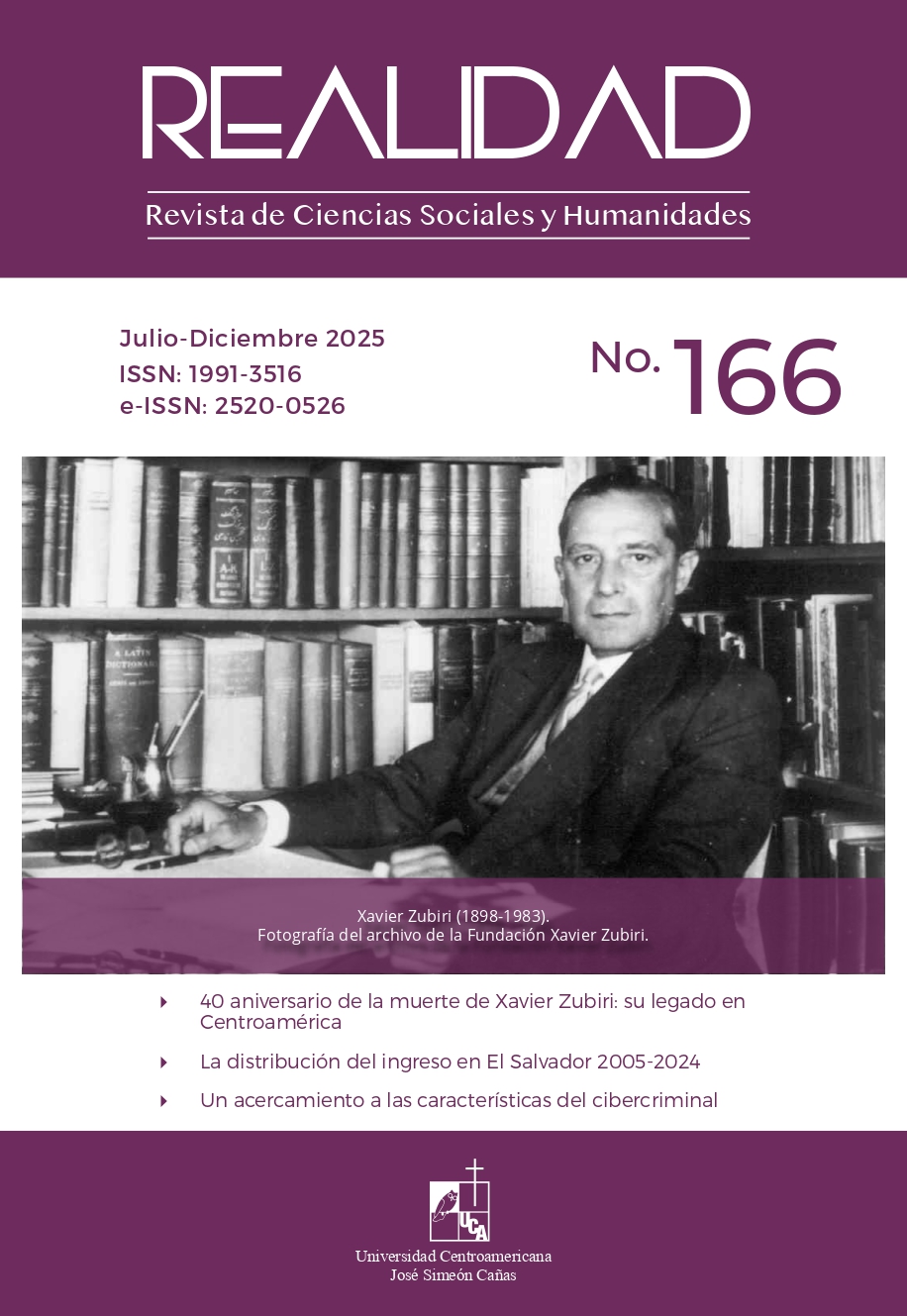Abstract
This present work attempts to understand the influence that Zubirian philosophy has had on Salvadoran thought. To this end, first of all, here can be found a chronological collection of the written production in Salvadoran academic spaces where Salvadoran intellectuals directly refer to Zubiri, locating as many titles as possible that account for presence. Next, continuing with the approach to Zubirian influence, the reception that his philosophy has had in some concrete cases is analyzed as a sample of its scope and importance within Salvadoran thought, highlighting that the Zubirian appropriation generally responds to its use in the analysis of the Salvadoran people’s situation. Under this framework, two distinct motivations can be distinguished in the use of Zubirian philosophy: On one hand, there is an interest in the totality of his thought to address some concrete questions. On the other hand, there emerges the need to confront, in philosophical terms and with ultimate rigor, the totality of the problems of our historical realities. First, those aspects of Zubirian philosophy that are incorporated to address particular issues presented. Second, attention is given to Ellacuría’s reception of Zubiri’s thought, in light of his objective to lay the foundations for a philosophy of liberation and, in the same way, to justify the role of the philosopher in intellectual activity, a role he exemplified as head of the Universidad Centroamericana José Simeón Cañas (UCA) in El Salvador.
References
Acevedo, C. (1993). El legado filosófico-político de Ignacio Ellacuría. ECA: Estudios Centroamericanos. 48(541-542), 1089-1107. https://doi.org/10.51378/eca.v48i541-542.7096
Alvarenga, L. y González, L. A. (2004). Una visión sobre el legado de Xavier Zubiri. Reailidad, Revista de Ciencias Sociales y Humanidades, (101), 625-626. https://doi.org/10.5377/realidad.v0i101.4403
Badía Serra, E. (2007). El concepto de Materia vista por Xavier Zubiri y Gustavo Bueno. Teoría y Praxis, (10), 28-48. https://camjol.info/index.php/TyP/article/view/14925
Badía Serra, E. B. (2014, 22 de diciembre). El Logos sentiente, la aprehensión primordial de realidad y la impresión de realidad en la filosofía de Xavier Zubiri. Teoría y Praxis, (25), 3-35. https://camjol.info/index.php/TyP/article/view/2111
Correa Schnake, F. (2006). Síntesis del “II Congreso Internacional de Filosofía Xavier Zubiri” 21-24 de junio de 2005 - San Salvador. Teología y Vida, XLVII(1), 129-135. https://www.redalyc.org/pdf/322/32247109.pdf
España Calderón, O. (1999). Pensamiento filosófico contemporáneo de la América Central. Editorial Oscar de León Palacios.
Ellacuría, I. (1990). Filosofía de la Realidad Histórica. UCA Editores.
Ellacuría, I. (1991). Veinte años de historia en El Salvador (Vol. I). UCA Editores.
Ellacuría, I. (1996). Escritos filosóficos (Vol. I). UCA Editores.
Ellacuría, I. (1999a). Escritos filosóficos (Vol. II). UCA Editores.
Ellacuría, I. (1999b). Escritos universitarios. UCA Editores.
Ellacuría, I. (2001). Escritos filosóficos (Vol. III). UCA Editores.
Fernández Font, F. (2016). Ignacio Ellacuría, filósofo y rector. ECA: Estudios Centroamericanos, 71(744), 67-80. https://revistas.uca.edu.sv/index.php/eca/article/view/3155
Fúnez, R. (2006). Acciones y habitudes humanas. Teoría y Praxis, (8), 76-94. https://camjol.info/index.php/TyP/article/view/15057
Fúnez, R. (2007, 10 de febrero). La noción de historia en la filosofía de Zubiri. Teoría y Praxis, (10), 122-140. https://www.researchgate.net/publication/364035288_La_nocion_de_historia_en_la_filosofia_de_Zubiri
González, A. (1995). Para una filosofía liberadora. UCA Editores.
Guandique, S. (1975). El Hegel de Zubiri resulta escolástico. Cultura, (60), 107-138.
Gudiel, H. (2008). Agnosticismo, indiferencia y ateísmo según X. Zubiri. Revista Latinoamericana de Teología. 25(74), 199-221. https://doi.org/10.51378/rlt.v25i74.4977
Guerra, V. M. (2007). Ensayo sobre los principios de una filosofía salvadoreña: elementos para una reflexión Filosófica de la sobrevivencia. Revista Humanidades, (11), 56-77. https://revistas.ues.edu.sv/index.php/humanidades/article/view/1860
Samour, H. (2003). Voluntad de liberación. La filosofía de Ignacio Ellacuría. Editorial Comares.
Samour, H. (2004). Zubiri en El Salvador. En J. A. Nicolás y O. Barroso (Eds.), Balance y perspectiva de la filosofía de X. Zubiri (pp. 755-761). Editorial Comares.
Schultz Montalbetti, M. J. (2024, 29 de junio). El rol de la universidad en Benedicto XVI e Ignacio Ellacuría SJ. Claves para pensar el aporte de las universidades católicas a la sociedad del siglo XXI, Perspectiva Teológica, 56(2), 551-569. https://doi.org/10.20911/21768757v56n2p551/2024
Romero, M. (2006). Historia de la filosofía en El Salvador. Editorial Delgado.
Rosales, L. (1956). La adolescencia de Don Quijote. Cultura, (7), 15-38.
Vivanco Díaz, B. (2016). El compromiso sociopolítico de las universidades jesuitas en Centroamerica. Revista de Fomento Social, 71(2), 303-328. https://www.researchgate.net/publication/330927738_El_compromiso_sociopolitico_de_las_universidades_jesuitas_en_Centroamerica
Zubiri, X. (2004). Naturaleza, Historia, Dios. Alianza Editorial.

This work is licensed under a Creative Commons Attribution-NonCommercial 4.0 International License.
Copyright (c) 2025 José Edenilson Coto Carpio






